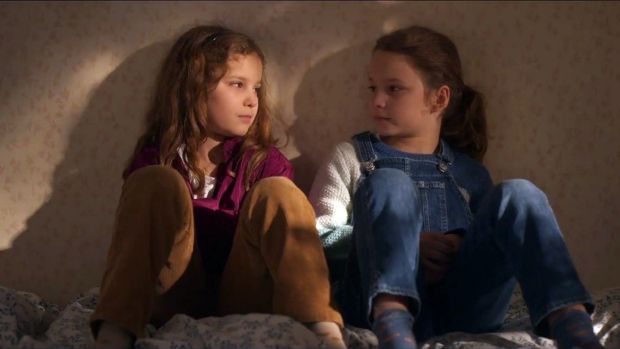
The relationship between parent and child can be a roller coaster, particularly during a child’s formative years when their emotions are strong but their life experience is thin. Throughout our young lives there are moments where we all just wish our parents understood our perspective or where we wonder why they are the way they are and why they raise us the way that they do. Things would be so much simpler if we could just understand where they’re coming from. The latest film from French director Céline Sciamma explores this what if.
In Petite Maman, after her grandmother dies, Nelly (Joséphine Sanz) accompanies her mother (Nina Meurisse) and father (Stéphane Varupenne) to her mother’s childhood home. While her parents go through her grandmother’s belongings, Nelly explores the surrounding woods and comes upon Marion (Gabrielle Sanz) who is exactly Nelly’s age and looks remarkably like Her. The two become fast friends, construct a hut together, eat lunch at Marion’s house (which looks remarkably like Nelly’s mother’s childhood home), and talk about their lives as Marion is days away from going to hospital for surgery. Through their new relationship each learns a bit about themselves.
What makes Petite Maman such a unique film is its offering of a perspective seldom seen or explored on the big screen. In the film, we’re shown the portrait of a child retreating into their own minds in the face of fear, uncertainty, and loneliness. Nelly is dealing with the loss of her grandmother and the regret and worry that comes from losing a loved one when you’re unsure if they’ve left you knowing how much they meant to you. Delving so deeply into the psyche of a child helps in making the film utterly engrossing and the emotions involved in the subject that much more heightened. As Nelly works through her feelings and comes to terms with many of the issues in her young life that her experience does not allow her to fully understand, the audience is able to empathize with the young girl through recalling their own experiences as children or even tough circumstances in their adult lives.
Adding to the poignancy of the film is its treatment and portrayal of the healing intergenerational trauma and the complicated nature of the relationship between a parent and a child. As we slowly come to know just how Nelly is connected to her new young friend that mysteriously resembles her and lives in a home just like Nelly’s mother’s, their conversations about each other’s dreams and pain take on an extra weight that is both touching and impactful. Through her interaction with Marion, Nelly comes to learn a little more about her mother’s life experience and gains perspective on the type of person she is apart from just being her mother. It’s the type of perspective that many hope they could gain regarding a parent in order to heal the broken links between them and close emotional gaps.
Petite Maman also allows Sciamma to cement her standing as a marvel of a visual director and storyteller. In addition to the numerous visual clues she inserts as to what’s going on with the story, she and director of photography Claire Mathon utilize very striking transitions and a subdued, soft natural coloring and lighting that add to the surrealist nature of the story. Sciamma must also receive a tremendous amount of kudos for her direction of twins Joséphine and Gabrielle Sanz who give two of 2021’s most moving and brilliant performances. Petite Maman is an extremely emotional film and these two young actors meet the challenge presented by the material superbly, conveying the feeling of each moment perfectly and demanding the empathy called for from the audience by the script through their portrayal of Nelly and Marion.
Petite Maman is one of the sweetest and emotionally resonant dissections of the relationship between parent and child we’ve seen in modern cinema, and perhaps ever. It takes the concept of two generations of a family having the chance to build a bridge of understanding through the impossibility of a child seeing the life shaping experiences of their own’s parent past in real time and getting to speak to them as its happening to gain new perspective not only on their mother or father, but on their own life as well. Part of the film’s poignancy is in the performances from its stars Joséphine and Gabrielle Sanz who are able to portray Nelly and Marion with a tenderness and undeniable chemistry that makes the theme that much more impactful. Céline Sciamma displays her immense talent as a director and writer both visually and in crafting a story and pulling the most out of child actors making their screen debut. This is a film that is both a joy to witness and one that speaks strongly and stirringly to the complexities of family.

